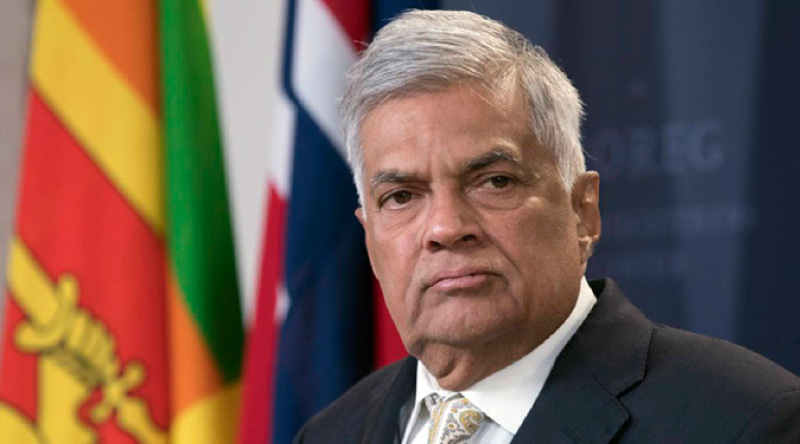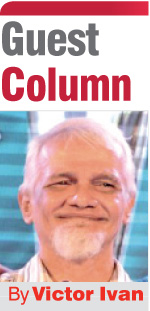Thursday Feb 19, 2026
Thursday Feb 19, 2026
Friday, 28 May 2021 00:02 - - {{hitsCtrl.values.hits}}

The change of the Government in 2015 can be considered as the last chance Sri Lanka gained to transform the system which is corrupt and cruel, and prevent the country being plunged into a level of a failed state. But that opportunity was utilised in a dishonest and deceitful manner. Not only Ranil Wickremesinghe but also all those who have held responsibilities in the Yahapalana Government, and now put the entire blame on Ranil Wickremesinghe, should be held responsible for that
 It seems to me that Sri Lanka will inevitably be plunged into a catastrophe. Unfortunately, there are no mature leaders among us who possess the required vision and pioneering potency to prevent Sri Lanka from being plunged into such a predicament. Therefore, would there be a positive change in the country, it will occur only after a massive disaster.
It seems to me that Sri Lanka will inevitably be plunged into a catastrophe. Unfortunately, there are no mature leaders among us who possess the required vision and pioneering potency to prevent Sri Lanka from being plunged into such a predicament. Therefore, would there be a positive change in the country, it will occur only after a massive disaster.
Playing with the pandemic
The leadership problem of Sri Lanka can be assessed from the approach adopted in facing the COVID pandemic. From the beginning, the Government seemed to be playing with the pandemic. Keeping the Army Commander by his side, the President boastfully remarked that the COVID-19 is not a big issue for us who had overcome a serious challenge like the belligerent LTTE. When the plague struck it was myth, not science that mattered most.
The COVID pandemic in the country has now reached a level which is steadily rising to a maximum height. All medical associations are of the view that if strict policies are not followed to prevent the spread of the pandemic, there could be a rapid increase in the spread of it and the death rate associated with it. They have emphasised that the country should be locked down at least for 14 consecutive days to arrest the situation.
The joint statement issued by the doctors in this respect and their explanations to the public has provoked opposition from the Government; and the Army Commander has also issued a statement criticising the doctors. It is also learned that a doctor has been asked to show cause for explaining the situation of corona in Sri Lanka to the Island newspaper.
Shouldn’t the public learn about the pandemic from doctors and not from politicians? The most dangerous thing is the refusal of the Government to accept the proposal made by medical associations to lock down the country for 14 days. It seems that the Government is more concerned with the economic loss than the human lives.
Incompetence of the Opposition
The question whether the country should be locked down for 14 days or not is an issue of crucial importance having a deeper impact on the livelihood of the people. If the policy being pursued by the Government in this regard is wrong, should not the opposition parties get-together and make a concerted effort to rectify the situation? What we hear from the Opposition today are only snivelling voices and that too, come as disunited and isolated mutterings.
If four medical associations, which were intensely divided on this issue, have been able to come together and put forward a joint statement, why couldn’t the Opposition political parties make a similar effort? Wouldn’t it be through such an effort that the Opposition could make a discernible impact on the Government?
Such a joint effort would not occur spontaneously or automatically. It is an objective that must be achieved with the intervention of a strong leader in the Opposition.
A joint cooperation is needed to resolve several other issues, not only the COVID problem. There must be a joint effort to overcome the failure of Sri Lanka as a state as well. It is necessary that the reforms needed for that are identified and a common consensus is reached on them in advance. None of them would come about spontaneously, and they could be described as goals to be achieved through initiative and concerted effort.
The nature of our leaders
The crisis in Sri Lanka can also be seen as a crisis of lack of leaders. It was due to the lack of mature democratic leaders that Sri Lanka as a country has gone down from crisis to crisis since independence, eventually becoming a failed state. None of the heads of state that Sri Lanka has produced in modern times can be considered mature democratic leaders. Nor can they be considered to have possessed an adequate theoretical knowledge on democracy. The fact that unlike India’s Lanka gained independence without making a distinct freedom struggle also had a greater impact on this situation.
Had there been an acute freedom struggle, undoubtedly, it would have paved the way for the emergence of tested and mature leaders while laying a firm foundation for the birth of a more advanced society equipped with an understanding of democratic values. Had it been so, it would have laid a strong foundation for building a united nation ignoring the differences based on caste, ethnicity and religion.
Yet, Sri Lanka gained independence without fulfilling those basic requirements. It could be considered a freedom gained by the display of submissiveness and adopting deceptive ways and without launching an aggressive freedom struggle. An interesting account of the conspiracies and deceptive means employed to gain independence, could be found in a lengthy series of articles written by Neville Jayaweera, a distinguished civil servant, based on an interview he had held with Sir John Kotalawala, a former Prime Minister of the country. Besides that, a book written about Sir Oliver Gunatilaka, in the form of an interview held with him, also carries information about it.
Sir John Kotalawala was reputedly a playboy type ruler. He is the only ruler who has donated a large extent of his valuable property to various government agencies. The history of the United National Party (UNP) would have been much different if D.S. Senanayake had made arrangements for Sir John Kotalawala to become the next Prime Minister after him, which he deserved in terms of seniority in the party, rather than making way for Dudley Senanayake, his own son, who was inexperienced and remained in the prime of his youth at that time, to succeed him.
The first choice of Ven. Henpitagedara Gnanasiha Thero, N.Q. Dias and Gunapala Malalasekara whom could be considered as the masterminds of the ‘56 revolution, was Dudley Senanayake, and not Bandaranaike. What would have been the nature of the ’56 revolution if Dudley had accepted the invitation without refusing it? Then what could have happened to Bandaranaike?
S.W.R.D. Bandaranaike did not establish the Sri Lanka Freedom Party (SLFP) to give prominence to his family. But after his assassination, his widow developed the SLFP as a family-oriented party. She even changed the electoral system to give more power to the Kandyan Sinhalese. Perhaps, the course of Sri Lanka would have been different if the SLFP had become a Democratic Party, and C.P. de Silva who was educated and experienced, was offered the leadership of the party following the assassination of Bandaranaike. C.P. became disqualified for the leadership of the SLFP because of his caste.
1978 Change of the Constitution
Although the heads of state that came to power in Sri Lanka up to 1978 could not be considered as competent and mature rulers, they however, did not attempt to break the democratic political framework inherited from the British. In spite of the fact that the judiciary was deprived of the ‘power of review’ by the 1972 Constitution, which it enjoyed up to 1971, the other good elements of parliamentary democracy were preserved.
The ban on MPs transacting business with the Government and the laws restricting election spending were continued until 1977. At that time, there were two major flaws in the governance of the state. One was the exacerbation of the divisive issues of ethnicity, caste and religion; the other was to pursue a policy of subsidy that incurred an unbearable burden on the Government’s expenditure. The expenditure on the subsidy of rice alone far exceeded the total expenditure on education.
It was in 1978 that a constitution which led to change the democratic nature of the political system completely, and turn the rule of state into an operation of large-scale plunder of public property, was enacted. With that, the economy which remained closed up to then was opened paving the way for rapid economic growth. The severe limitations imposed on democracy eventually resulted in protracted violent struggles turning the country into a land of incessant bloodshed. The large-scale looting of public property was another important factor among many other misdeeds. All the presidents who succeeded J.R. Jayewardene carried forward the plunder that he introduced to the state rule, adding new elements to it.
Revolution and counter-revolution
There are two most striking features inherent in this corrupt system. One is that no person elected to the presidency has ostensibly felt that it is a serious offence to misappropriate public property which is under his or her temporary custody. The other feature is that no other leader has so far challenged this system except for reaping advantage of it. Under almost every presidential rule, there has been large-scale looting of public property carried out with the connivance of the Presidents themselves, but not a single motion has been tabled in Parliament in the past 43 years demanding for an inquiry into the issue.
The change of the Government in 2015 can be considered as the last chance Sri Lanka gained to transform the system which is corrupt and cruel, and prevent the country being plunged into a level of a failed state. But that opportunity was utilised in a dishonest and deceitful manner. Not only Ranil Wickremesinghe but also all those who have held responsibilities in the Yahapalana Government, and now put the entire blame on Ranil Wickremesinghe, should be held responsible for that.
Not only that the Yahapalana regime did not keep to the promise made to abolish the presidential system, but also failed to bring the presidential system under the rule of law. The Yahapalana regime too, defended the opportunity to plunder the public property by the President, the Ministers and the MPs of the ruling party, which has become a permanent feature of the state administration, and made it an important aspiration of them as well.
The ensued defeat of the Yahapalana regime can be seen as a historic punishment imposed on it, for its narrow-mindedness, bigotry and selfishness. Now we have no leaders. The vacuum is likely to be filled by making the country a Chinese colony.